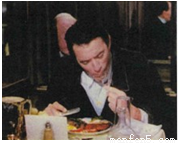题目内容
Honesty is always the best policy, especially when it comes to mental health problems. In a TV ______, one girl gets very real about dealing with anxiety and panic.
“ I was the bast student in my high school. I put so much ______ on myself,” she said. “ I never ______ a class. But I got sick during 10th grade and I started to ______. That’s when the panic attacks began.” She goes on to describe what a panic attack ______ like, “One day the teacher handed me my grade ______, and I couldn’t breathe. My heart was beating very ______. I felt disconnected. I saw people trying to talk to me but I couldn’t hear them.Afterwards, I was sent to ______,” she shared.
It was then ______ the attacks started happening ______ daily, and they haven’t stopped. “Last year I started college. And I can’t be the best student here no matter how hard I try,” she said. “Everyone is so ______. My panic attacks got so bad that I had to ______ my first semester.”
However, now she is facing her anxiety, and things are getting better. “ I used to try to hide ______. I thought that ______ nobody know, it didn’t exist,” she said. “But the more I talk about my ______, the more I realize that other people experience ______ things. So I’m trying to express it more. I had a great teacher ______ told me, ‘Instead of letting anxiety keep you from doing your art, let it be the thing that ______ your art.’”
Recently, woman all over the world took to Twitter to ______ what anxiety is like. We are ______ alone.
1.A. project B. program C. platform D. station
2.A. weight B. height C. pressure D. measure
3.A. joined B. succeeded C. failed D. attended
4.A. fall behind B. fall down C. leave behind D. leave alone
5.A. looks B. sounds C. tastes D. feels
6.A. report B. survey C. research D. notice
7.A. mildly B. wildly C. slowly D. severely
8.A. school B. work C. hospital D. home
9.A. when B. since C. before D. that
10.A. still B. always C. merely D. almost
11.A. ambitious B. anxious C. talented D. experienced
12.A. arrange B. perform C. operate D. cancel
13.A. it B. them C. me D. us
14.A. unless B. if C. while D. as
15.A. confidence B. dream C. issue D. desire
16.A. similar B. familiar C. various D. serious
17.A. who B. whom C. whose D. which
18.A. abandons B. quits C. motivates D. protests
19.A. advertise B. advise C. share D. compare
20.A. always B. sometimes C. seldom D. never


